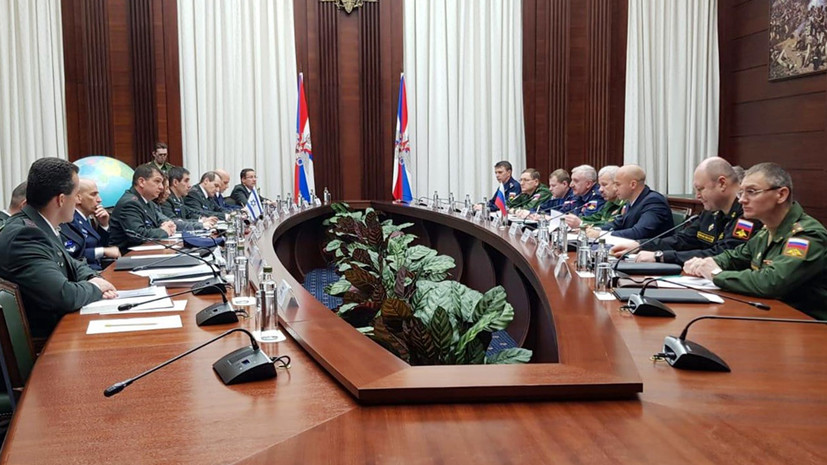On Tuesday, December 12, high-level representatives of the military departments of Russia and Israel held talks in Moscow. During the meeting, the parties discussed the situation in the Middle East, as well as measures to prevent dangerous incidents in Syria, including the peculiarities of the direct communication channel between Hmeimim airbase and the Israeli commander.
"During the talks, topical security issues of the Middle East region, the situation in the Syrian Arab Republic, as well as the functioning of a direct communication channel between the Russian Hmeimim airbase and the Israeli Air Force command center to prevent dangerous incidents threatening the life of the Russian and Israeli soldiers were discussed," Ministry of Defense.
It is noted that representatives of the defense ministries reached an agreement on the continuation of contacts. The Israeli delegation at the talks was headed by the Chief of Operations of the Israeli General Staff, Major General Aaron Khaliv, and the Russian side was headed by the Deputy Chief of the Main Operations Directorate of the General Staff of the Russian Armed Forces, Major General Vasily Trushin.
In turn, the press service of the Israel Defense Forces (IDF) said that the talks were held in a good, business and professional atmosphere. During the meeting, officers of the Israeli army also told Russian colleagues details about the Northern Shield operation conducted on the border with Lebanon.
The meeting of two military delegations took place after Russian President Vladimir Putin and Israeli Prime Minister Benjamin Netanyahu held telephone talks. They took place on December 8 at the initiative of the Israeli side.
Then Putin, commenting on information about the operation of the IDF in the north of Israel, stressed the importance of ensuring stability in the area with the coordinating role of the UN Interim Force in Lebanon.
Recall, on December 4, Tel Aviv announced the launch of Operation Northern Shield in the north of the country. Within its framework, the military must identify and neutralize the network of cross-border tunnels that the members of the Lebanese Hezbollah group created. Note that since the beginning of the operation, the IDF reported the discovery of three such structures, each of which was subsequently mined by the Israeli military.
Operation #NorthernShield UPDATE: IDF soldiers exposed ANOTHER attack tunnel from Israel to Israel. 3rd tunnel exposed in a week. Hezbollah terrorists seek to kill innocent Israelis. We will stop them. pic.twitter.com/OsdJGvmKr0
- Israel Defense Forces (@IDF) December 11, 2018“If Hezbollah makes a big mistake and decides to attack us or interfere with the work carried out here, it will receive such a strong blow that it cannot even imagine,” said Netanyahu during a trip to the Lebanese-Israeli border.
The UN temporary forces in Lebanon (UNIFIL) confirmed the presence of a tunnel near the recognized border of the two countries, the so-called “blue line”. At the same time, the press service of the Lebanese army announced readiness for any situation on the border with Israel. The army units, in coordination with UNIFIL, patrol the border area strenuously and take all necessary measures to ensure security on the Blue Line.
"The chain of tragic accidents"
The coordination mechanism between the Russian and Israeli military, designed to prevent possible clashes of the parties on the Syrian track, has been in effect since the fall of 2015. However, in mid-September 2018, the actions of a group of F-16 fighters of the Israeli Air Force in the skies over Syria led to the disaster of the Russian reconnaissance aircraft IL-20, which was flying in the idlib de-escalation zone.
After launching a rocket-bombing attack on objects in the Latakia region, an Israeli fighter crossed the trajectory with the Il-20 who had landed to land and put it under fire from Syrian air defenses. The Russian plane was shot down by a C-200 missile, all 15 crew members died.
The Ministry of Defense of the Russian Federation blamed the crash on Tel Aviv and pointed out violations of the 2015 agreements. In particular, Israel notified the Russian military about the operation just a minute before striking. In addition, the IDF officer misled the Russian side regarding the areas of operation, which did not allow for the withdrawal of the IL-20 to a safe area.
The day after the disaster, the Russian president called the crash of the IL-20 a “chain of tragic accidents” and announced its intention to strengthen measures to ensure the safety of its military in the SAR. In mid-October, three divisions of the upgraded S-300PM-2 air defense system were transferred to the Syrian military. Now there is a process of training the personnel of the army of the Arab Republic.
After the crash of the IL-20, the leaders of Russia and Israel met in person only in Paris on November 11 at events to mark the 100th anniversary of the end of the First World War, but it was not about full-fledged negotiations. At the same time, Putin and Netanyahu agreed during a telephone conversation on December 8 about the intention to work through all the necessary issues for a personal meeting.

